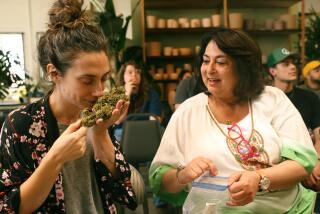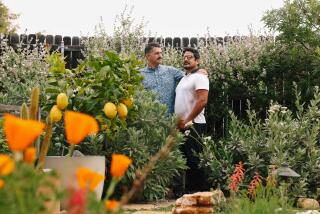Our kind of summer reading
- Share via
THE leap is infectious. It’s only fair that you should know. The first time you order seeds from a catalog will not be your last. These tiny, enigmatic packets of life arrive by mail in homely manila envelopes, delivering one of the gardener’s happiest and holiest moments of the year.
By virtue of your address, you get to send in your wish list twice a year: early spring and now. That’s how it’s best done, here in the land of two harvests. The garden cliche in the East and Midwest -- curling up in an armchair beside a fire, sipping cocoa and poring over seed catalogs on a blustery February day -- can still be part of your yearly regimen, but in a summery, Southern California way.
While the majority of the nation’s gardeners spend the weekend toiling in a stifling, dank, mosquito onslaught, you, oh wise one, can loll under a poolside umbrella, sipping a mojito, scanning seed catalogs and dreaming of autumn days.
You’ve already planted your zukes, cukes, beans, basil and bells. You’ve mulched and weeded. You’ve fed nutrients and fended off pests. Finally, during our true dormant season, you get to rest awhile and let the plants do their thang.
While those other gardeners bust their humps bringing in a single harvest before the first frost, you get to fantasize about the cool, crisp snap peas your second harvest of the year will produce. You can imagine your fall-winter garden providing chervil, radicchio and butter leaf salads -- picked, rinsed, tossed, dressed and enjoyed right there on the patio under mild November skies.
Finding a favorite catalog is also part of the sunny adventure. Most are free or cost a mere scratch of coins, and you can request them year-round. You’ll discover a catalog for every botanical whim. There are seed companies that sell primarily newfangled hybrids. Others sell oldfangled heirlooms. Some sell only irises; a few sell just potatoes and garlic. The choices are myriad.
I like to hunt through the catalogs of companies in the West first. Though the results may be only minimally different, I prefer using seeds that have been farm-raised in soils comparable to ours and under reasonably similar weather conditions. Seeds sold by Western catalogs often are grown on mom ‘n’ pop farms. (That Italian Romanesco broccoli, therefore, has been reared in New Mexico, not New Jersey.) Only after I’ve finished “out West” do I scope out seeds from other realms.
“But wait, wait, wait,” you’re demanding, “Why seeds? Why not nursery transplants? And why mess with catalogs? Can’t I just get my seeds at a superstore?” Reasonable questions.
The answers depend upon what kind of garden you’re looking to grow. Certainly you can raise beautiful, high-quality gardens employing the plants and seeds you find for sale around town. What sets a catalog garden apart from its neighbors? Unparalleled variety and control.
Catalogs offer dozens upon dozens of nearly every plant type not available locally in any given year. Sometimes the only place you’ll find pink Jerusalem artichoke seeds is in a catalog.
Additionally, when you raise plants from seed in your own backyard, you will know exactly what fertilizers and pesticides have -- or haven’t -- been applied. If you’re looking for organic purity, seed sowing is the best way to go.
Bountiful Gardens, the company headed by John Jeavons, is a wonderful place to start. This California company sells seeds that are untreated and open-pollinated, meaning you can save the seeds for next year. I bought my first arugula from Bountiful Gardens, and it returns on its own every fall.
The catalog has an ancient type of wheat (in cultivation 7,500 years ago), and cover crops with names that sound like hip-hop artists -- tyfon and hairy vetch. Flowers, herbs, tools, workshops and inspiration are all inside these pages.
Peters Seed and Research in Oregon is great for kales, cress and cabbages. It also sells “early” tomatoes that are good for sowing in the upcoming months. Plant these quick-fruiting, chill-tolerant plants, and you can e-mail photos of yourself picking tomatoes on Christmas Day to that friend who’s freezing in Detroit.
Within the Territorial Seed Co. catalog, you’ll find all the great European greens, rutabagas, parsnips, mache. You’ll also find tools worth a gander. After all, you’ve just finished months of weeding and pruning, staking and spraying; you’ll be intimately aware of what tools you need. I’m attracted to the tools with goofy names. To my delight, Territorial Seed offers the Weed Dragon, the Garden Rocker (an ergonomically designed gardener’s seat) and the Hoe-Matic Hoe and Cultivator, as well as other tools with more technical names such as “shovel” and “rake.”
Seeds of Change is one of my favorite seed stops because it focuses so much of its stock on traditional food crops of the Americas. You can find the yacon (Bolivian sun root) for which you’ve always been hankering. You can find four types of quinoa (a cereal grain). But for this fall’s garden you might want to order flowers. Seeds of Change has asters, dianthus, calendulas, snapdragons, sweet peas -- loads of blooms worth taking the time to wade through.
I’ve been using the Peaceful Valley Farm & Garden Supply catalog for nearly as long as I’ve been gardening. What is particularly wonderful about this company is that it usually has that obscure item you’ve only just read about. You’ll be flipping through “The Secret Life of Plants” by Peter Tompkins and Christopher Bird and stumble across a reference to a soil amendment called Azomite, which is mined from a remote mountain in Utah and purported to provide your earth with every vital mineral necessary for healthy, vibrant plants.
You’ll read about something like Azomite, little known and offbeat, then check with the folks at Peaceful Valley, and sure enough: They will carry it. They have Brix Mix (an amendment that increases the nutritive quality of your food crops substantially) in bulk. They have kelp. They have farm machinery. They don’t sell coffee makers or flags of foreign countries, but give them time.
I turn to the Nichols Garden Nursery catalog for herbs, but it also lists a great collection of unusual vegetables and flowers. I know of someone who ordered mason bees, but shipping flying insects by airmail just doesn’t seem right.
My all-time favorite seed catalog is put out by Seed Savers Exchange. Started in 1975, the company has grown to be one of the finest heirloom seed banks in the world. The Seed Savers Yearbook -- about 450 pages -- is sent out in February, followed by the thinner Summer Edition in August and the Harvest Edition in November. The yearbook alone is beefy enough to serve as an impromptu booster seat for Grandma.
Eight hundred members of the Seed Savers Exchange offer seeds for at least 10,000 rare and unusual types of vegetables, fruits and flowers. These seeds have been passed down through the generations, from family and friend. It is tremendously rewarding to buy seeds this way -- to connect on a small scale to some Joe in Idaho, to buy seeds that his great-great-uncle on his mother’s side once grew too.
I can get so lost in these catalogs that no amount of sunscreen could save me. But the fun of summer seed shopping far outweighs the pain of a minor-league burn. Kickin’ it by the water, sipping something cool, dreaming up my next fall and winter garden -- well, you won’t hear me complaining.
Tony Kienitz is the author of “The Year I Ate My Yard.” He can be reached at home@latimes.com.
*
(BEGIN TEXT OF INFOBOX)
Fresh ideas, same plot
Some pine for Pottery Barn, but gardeners swoon for their seed catalogs. Most seed companies offer them for free or a nominal fee.
Bountiful Gardens: 18001 Shafer Ranch Road, Willits, CA 95490; (707) 459-6410, www.bountifulgardens.org.
Peters Seed and Research: P.O. Box 62, Riddle, OR 97469; www.pioneer-net.com/psr.
Territorial Seed Co.: P.O. Box 158, Cottage Grove, OR 97424;
(800) 626-0866,
www.territorial-seed.com.
Seeds of Change: Request catalog by calling (888) 762-7333 or going to www.seedsofchange.com.
Seed Savers Exchange: 3094 N. Winn Road, Decorah, IA 52101; (563) 382-5990, www.seedsavers.org.
Peaceful Valley Farm & Garden Supply: P.O. Box 2209, Grass Valley, CA 95945; (888) 784-1722, www.groworganic.com.
Nichols Garden Nursery: 1190 Old Salem Road N.E., Albany, OR 97321; (541) 928-9280, www.nicholsgardennursery.com.
-- Tony Kienitz






